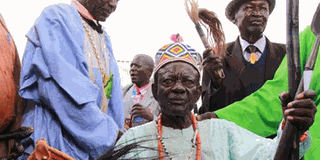The word ‘Luo’ and the theories of its true origin

Mzee Nyandiko Ongadi (centre) being installed as chairman of Luo Council of Elders (Ker) during a traditional ceremony outside in Homa bay County on December 27,2015. The Luo inspire such passion in the leaders of Kenya’s other large ethnic communities that, whenever those leaders turn their tongues to my community, they are so angry that they forget even the simplest universal rules of grammar. PHOTO | MAURICE KALUOCH | NATION MEDIA GROUP
What you need to know:
- The Luo inspire such passion in the leaders of Kenya’s other large ethnic communities that, whenever those leaders turn their tongues to my community, they are so angry that they forget even the simplest universal rules of grammar.
- The question is: Where did the people get their ethnic name from? How did the word Jaluo - or Jalwo - arise?
- As a self-appraisal term, then, the word jaluo may have contained the semantic lacing of a person who is (mentally) quick to luwo, that is to say, quick to chew, swallow and digest, namely, to grasp ideas quickly and to put them to good use.
Controversy, it appears, is the other name of the Luo, my ethnic people.
They inspire such passion in the leaders of Kenya’s other large ethnic communities that, whenever those leaders turn their tongues to my community, they are so angry that they forget even the simplest universal rules of grammar.
Take the anti-Luo politician who raved the other day that “...Jaluo are given to complaints...”
I ask again: How do you square the singular prefix ja with the plural verb are?
As I have explained here before, the Luo prefix ja (plural jo) refers to a “person of” (say, a country, a habit, a profession, a race, a tribe and suchlike).
Thus we get Jaingresa (an Englishman or woman), jasomo (a scholar), jayalo (a priest), janak (a professional tooth extractor), janek (a killer), janeko (a mad person); jamecho (a robber), and so on.
NAME ORIGIN
The question is: Where did the people get their ethnic name from? How did the word Jaluo - or Jalwo - arise?
From my reading, the word may have arisen as a self-given epithet either of jaluwo “follower” (after cattle), or of jalupo, “follower” (after fish) - or of both, since luwo and lupo (as fishing is called north of Nyanza Gulf) or lopo (as it is sometimes called south of it) have the same etymology.
As I have pointed out here before, the verb luwo - though it may here conceivably come from a different etymology - also means “to speak”, “to utter a word”, “to tell”, “to make a clear statement” - as opposed to speaking incoherently.
In reverse, it also means to follow fully (winjo) what is being said or what has been laid down as law (luwo chik).
As a self-appraisal term, then, the word jaluo may have contained the semantic lacing of a person who is (mentally) quick to luwo, that is to say, quick to chew, swallow and digest, namely, to grasp ideas quickly and to put them to good use.
But Prof Bethwell Ogot and other Luo historians speak of a third possibility.
WARRIOR
The first man ever to be called lwo had earned that name out of universal tribal admiration as a warrior.
Though luoro and luor have the same root, the one denotes “cowardice” and the other denotes awe-inspiration and respect.
Here “fear” includes the kind that the priests mean when they claim to “fear God”.
Ever since Ezra and other Jewish returnees from the Babylonian exile, to fear the Judaeo-Euro-Christian divinity is not only to demonstrate great respect for him but also to cower with dread before him - opposite reactions probably dictated by the same mental impulse.
This contradictory significance of those words would have come naturally from the fact that, although the name lwo first denoted a coward, the owner later exhibited such extraordinary courage that the name immediately conjured up concepts of valour and awe-inspiration.
Hence - as I have pointed out here before - to be awful is to be “feared in terror”, whereas to be awesome is to be “feared in reverence”.





